Beyond Auburn Magazine
Spring/Summer 2022: Imagine Enhanced Education
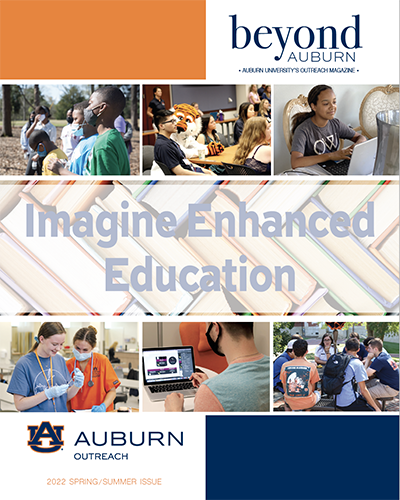
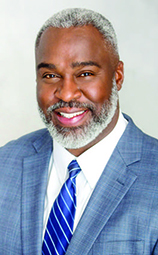
This year, Auburn University will host representatives from the Southern Association of Schools and Colleges, or SACS, for our 10-year reaffirmation review of our institutional accreditation. As in past reviews, University Outreach is working with Auburn’s SACS team to address the important accreditation principles which focus on mission centrality and administrative effectiveness. It is another great opportunity to tell the story of how Auburn is making a difference through engagement of university knowledge and expertise toward improving the quality of life all across our state and beyond.
First and foremost, outreach is a mission imperative of the land-grant university to serve the community beyond campus. This land-grant heritage greatly influences us, but outreach is also a central element of the university strategic plan, which makes our work relevant and accountable to future needs.
Secondly, outreach work is institutionalized and supported throughout the university. Outreach engagement is not just limited to the Division of University Outreach, but also involves faculty and students throughout the academic colleges, as well as our colleagues statewide in the Alabama Cooperative Extension System. This corps of engaged faculty, professionals and students provides a wide range of outreach programs and strategic initiatives to the public each year.
Mission centrality, comprehensive institutional engagement and program capacity is just part of the picture; impact—the element of making a difference—is the real story behind Auburn’s outreach engagement. Significantly, the collective impact of Auburn’s overall outreach work is well documented and recognized, most recently by our classification as a Carnegie Community Engagement institution.
Every year, Auburn helps tens of thousands of people meet their educational needs through college access, continuing and professional education and lifelong learning programs. Access to university expertise and consultation helps individuals, organizations and communities solve problems, improve systems and encourage innovation. Auburn partners with hundreds of community-based agencies and organizations to promote community engagement and public service that addresses significant issues in the state, such as access to health care, food security and workforce development.
I have no doubt we will have a very positive report for our SACS review this year. But more importantly, we have a very positive story to share with all our stakeholders whom we engage on campus in outreach work and those we serve off campus by that work. Outreach is a powerful example of the collective impact of engaged collaboration in tackling societal issues.
In conclusion, I would like to offer my congratulations to Dr. Jay Gogue on his amazing tenure as Auburn’s president. His encouragement and promotion of outreach and service certainly advanced Auburn’s status as nationally recognized community-engaged institution. It has been a great experience working with President Gogue over these years and I very much appreciate his leadership and interest in University Outreach and Auburn’s engagement mission.
I would also like to congratulate President Chris Roberts and Interim Provost Vini Nathan in their new roles in Auburn’s administration. I have had the opportunity to collaborate with President Roberts and Provost Nathan during their tenure as deans, and both are great supporters of outreach and faculty engagement at Auburn. I am looking forward to working with them as we strive to fulfill what President Roberts expressed in his first message to the Auburn family this shared commitment to the citizens we serve through impactful community engagement.
Together, we can make a difference! Royrickers Cook, Ph.D. Vice President for University Outreach and Associate Provost

Various colleges, schools, units and departments gathered at The Hotel at Auburn University and Dixon Conference Center to discuss existing outreach programs across the state, potential collaborations, and University Outreach upcoming events.

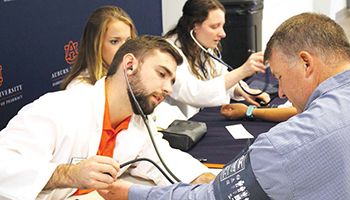
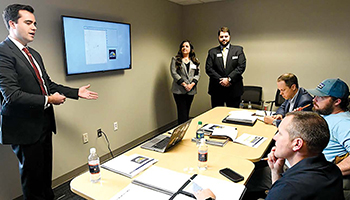

Outreach at Auburn University is an essential component in its three-prong mission of instruction, research and outreach.
Support outreach today!

Imagine teaching real–world applications and innovation to current and future teachers. Imagine applying research and common sense inside the classroom. Imagine education where learning is exciting and fun. Imagine collaboration across disciplines and across state lines. Imagine taking the class outside of the room. Imagine teaching educators to think outside of the box. Imagine kids learning earlier when they are eager to learn. Imagine introducing youth to career choices at an early age, so they will better know what they want to do after graduation. Imagine challenging kids to think and problem solve. Imagine combining resources and knowledge to improve the lives of citizens. Imagine a world where differences are appreciated and seen as an advantage. Imagine working together as a team to make education in Alabama better.
University Outreach provides educational opportunities for all ages, including summer academic camps and college preparatory programs for youth, professional and job training courses for working adults, and lifelong learning programs for seniors.
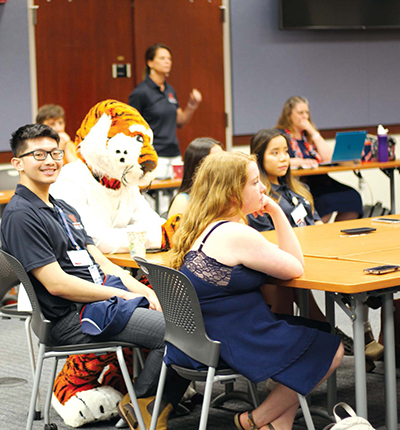
It is more than camp; it is campus life. Each summer, Auburn Youth Programs, or AYP, brings thousands of students to campus, where they explore potential majors, gain hands-on experience and interact with Auburn University faculty, resources and technology. Camp participants experience life on the Plains as they reside in Auburn’s resident dormitories, eat at campus dining facilities and enjoy social and recreational activities.
This summer the highly anticipated veterinary and architecture camps return to an in-person format. In junior, senior and advanced Vet Camps, students learn about veterinary medicine first-hand from Auburn University College of Veterinary Medicine faculty, technicians and staff. Participants garb up for surgery, learn to perform sutures, insert IVs, draw blood, intubate for surgery and bandage wounds, all inside a real operating room.
Architecture Camp is an intensive week-long workshop that takes place in the studios of the Auburn University School of Architecture, Planning and Landscape Architecture. Students begin with basic concepts and conclude with several architectural design projects while engaging with and learning from university professors.
This year campers were able to enjoy the Auburn experience off the Plains with expanded AYP offerings in Mobile and Dauphin Island locations. In Mobile, the Industrial Design Workshop, hosted by the College of Architecture, Design and Construction’s Industrial Design program, engaged rising 9th through 12th grade students interested in a professional career in industrial design. The week-long workshop offered an intensive design experience beginning with the identification of a design problem and rapidly progressing through idea generation, concept development and exploratory prototyping.
Also in Mobile, the high-demand Pharmacy Camp, offered in partnership with the Harrison College of Pharmacy, also made its debut. The week-long day camp provides insight to the professional aspects of pharmacy including applying to pharmacy school, interview tips and working as a pharmacist. Additional pharmacy-related topics covered are community pharmacy, ambulatory care and inpatient/acute care pharmacy.
South of Mobile, lies Dauphin Island, a barrier island just off the gulf coast of Alabama, and the site of Coastal Fisheries Camp. The intense five-day academic camp introduces high school students to the marine environment and is designed to teach a better understanding of the various fields in marine science. Participants spend a great deal of time in the field observing and working with plankton nets, seine nets, water sampling bottles, refractometers and water quality test kits and other equipment. They collect and identify marine species from various habitats and participate in lab and field discussions, all under the guidance of award–winning marine and aquatic educators from Auburn University and Dauphin Island Sea Lab.
AYP, offered through the Office of Professional and Continuing Education, or OPCE, is an extension of University Outreach that sponsors and executes a variety of summer programs designed to educate and inspire youth. AYP exists to promote educational and enjoyable summer programs to empower youth to find their passion, strengthen skills and shape their future.
To learn more about Auburn Youth Programs or to see the complete list of online camps and programs, visit auburn.edu/outreach/opce/auburnyouthprograms.
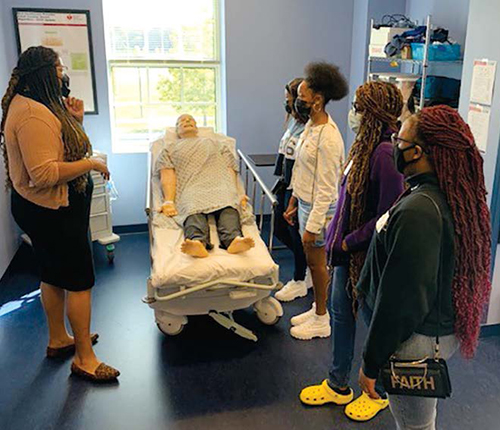
The Auburn University Center for Educational Outreach and Engagement, or CEOE, has been awarded a grant to further its mission of enhancing the development of K-12 schools in Alabama. The Workforce Innovation and Opportunity Act, or WIOA, grant from the Alabama Department of Commerce will provide $214,000 for a partnership with the Macon and Bullock County Career Technical Education Centers. The funding is renewable for three years.
Auburn’s CEOE has used WIOA funds to create the Auburn University Success Plus Program, or AUSPP. CEOE has partnered with Bullock and Macon County schools to offer AUSPP at Bullock County High School, Booker T. Washington High School and Notasulga High School. Career tech students from both counties are guided based on their interest in health care professions.
Auburn faculty and consultants teach eight different areas of college and career readiness preparation at both the county career technical education sites.
WIOA funds are intended to support Alabama workforce investment activities to increase employment, retention and earnings in the state by helping underserved students attain nationally recognized and/or postsecondary credentials. With Auburn’s assistance, the quality of the Alabama workforce will improve, economic self-sufficiency will increase among underserved students and workers will meet the skill requirements of employers and enhance the productivity and competitiveness of our state.
The grant also permits CEOE to provide students career-related campus visits to Auburn. Such visits are designed to complement and correlate with the health care-related courses offered at each career tech center.
To date, students have visited the Edward Via College of Osteopathic Medicine, the Harrison College of Pharmacy, College of Nursing and the Auburn University Medical Clinic.
These visits provided students an opportunity to explore the facilities and focus on future career goals. Students were also able to engage in professional networking by meeting and conversing with Auburn students studying the medical sciences. AUSPP students also met college professors, deans and other related personnel.
A visit to the Auburn University College of Veterinarian Medicine campus is being planned.
WIOA additionally emphasizes entrepreneurship training. LaKami Baker of the Auburn University Raymond J. Harbert College of Business has provided a year-long training program for AUSPP students, with a focus on entrepreneurship in health care. Opportunities to visit and train in business facilities culminated in a spring Tiger Cage entrepreneurship competition, during which students pitched their business concepts to a panel of professionals.
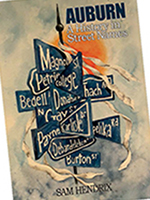
Local Auburn teen Kounte Threadgill is the recipient of the Gatsy Rice Campership, the inaugural camp scholarship funded by the newly published book “Auburn: A History in Street Names.”
Fifteen year-old Kounte is recognized for acting heroically when a fire engulfed his family’s home in 2020. Only 13 years old at the time, Kounte ran through the fire to save his four younger siblings who were separated by the flames in different rooms of the home. Because of his brave acts, he and his family were safely out of the home by the time firefighters arrived. Kounte later said, “I didn’t think, I was just acting.”
While the family lost most of their belongings in the fire, the fire crew was able to retrieve one of Kounte’s most prized possessions–his calculator. The teen, who dreams of one day being a doctor, enjoys math and science and has chosen to attend ACT Bootcamp. The weeklong camp provides an in-depth review of the ACT exam and introduces students to the admissions process, career services and student involvement opportunities at Auburn University.
Authored by Sam Hendrix, “Auburn: A History in Street Names” tells a comprehensive history of the City of Auburn. Proceeds from book sales fund an endowment at Auburn University to provide academic camp scholarships for Auburn Youth Programs. The “camperships,” which cover costs of registration, on-campus lodging and meals, provide the opportunity for local youth to attend week-long academic summer camps at Auburn University.
Each camp scholarship is named for the remarkable individuals whose stories are told throughout the book. Gatsy Rice, for whom the inaugural scholarship is named, came to Auburn in the 1840s as a servant in a local household. Though born into slavery, Rice had an entrepreneurial spirit that allowed her to climb the economic scale. After the war, she prospered as an independent seamstress–mending uniforms of East Alabama Male College cadets and others in town–and running a boarding house. She eventually owned property in both downtown Auburn and Opelika.
“Auburn: A History in Street Names” made its debut in 2021 and sold out in 29 days. A second printing is expected to be available in the spring of 2022. For more information on the book or the Sam and Mary Ellen Hendrix Endowed Fund for Excellence in the Office of University Outreach, visit auburn.edu/outreach/opce/auburnstreetnamesbook.
Auburn Youth Programs, a program area within the Office of Professional and Continuing Education, is an extension of University Outreach that sponsors and executes a variety of summer programs designed to educate and inspire youth. To learn more about Auburn Youth Programs, visit auburn.edu/outreach/opce/auburnyouthprograms.

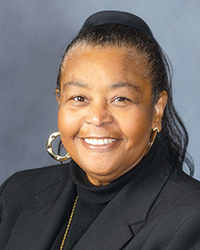
The Center for Educational Outreach and Engagement, or CEOE, is the sole-source provider of Culture Bump™ training for Alabama educators and students throughout the state under the direction of Stacey Nickson, retired CEOE director, in collaboration with Carol Archer, Culture Bump™ Creator, who serves as a consultant to Auburn University. Over the past decade, CEOE has provided Culture Bump™ training to many entities including Birmingham City Schools, Trussville City Schools, the Black Belt Community Foundation Head Start Program and directly to students in Macon County Schools and Bullock County Schools through the Workforce Innovation and Opportunity Act, or WIOA.
Culture Bump™ is a skill-based program that teaches how to use differences as a way to connect with others and to find common ground. It is focused on a practical application in everyday real-life encounters between friends, family as well as people from different regions, ethnic groups, or country of origin. This practicality and real-life application are implicit in its mission statement: Culture Bump™ redefines cultural understanding to give people the tools and confidence to interact with anyone anywhere.

One of the participants in the WIOA program, Cadence Harris, a junior at Bullock County High School, states her experience with learning about Culture Bump™ concepts and especially about the Culture Bump™ 8-step tool for dealing with differences has been a powerful experience. Specifically, she says that practicing Culture Bump™ steps has impacted her relationships with her family and friends as well as providing her with self-confidence about her future.
Harris said, “I think Culture bump will help me to go into a predominantly white college because I have never been in school with a lot of different races It helps me to approach people in the right way—the correct way. This is something that is very important to me.
I realized I have culture bumps with my family. As children we are taught that parents are always right. But my generation is evolving — we are headstrong; I’m headstrong and culture bump helps me because I talk to them about culture bumps and that helped me to understand where they were coming from. I was able to kind of show them some mercy.
My best friend is from Detroit, and she had a culture bump because in Alabama we say “soda” and she went into a store and asked for “pop.” In the class, we laughed about that culture bump. She also is teaching me some Detroit slang - like “you got hamburger (food)” actually means “Do you have money?” Culture Bump makes me see these things in a positive way.
Going through the 8 steps made me actually sit down and think about people that I have never met - that I am going to meet - It opened my eyes to the real world outside of home. It opened me up to society.
Culture Bump™ redefines cultural understanding to give people the tools and confidence to interact with anyone anywhere, indeed.”


On Jan. 18-20, 2022, student robotics teams from across the nation were able to put hours of hard work to the test as they competed in the 2022 SCORE Showdown held at Great Wolf Lodge in LaGrange, Georgia. Hosted annually by the Southeastern Center of Robotics Education, or SCORE, and in partnership with the Robotics Education and Competition Foundation, or REC, the event is a premier VEX robotics tournament where school teams across three age levels–elementary, middle and high school–get to showcase innovative robots that they’ve built by competing in a series of qualifying and final matches.
Teams competed in the VEX Robotics Competition, also called VRC, or the VEX IQ Challenge, also called VIQC, where students not only got to display their robotics and STEM skills but, through competition they got to build upon teamwork, critical thinking, project management, problem solving, leadership and communication skills.
Team tables were set up throughout the Great Wolf Lodge conference center while surrounding stations for robotics practice fields, inspections, skills challenges and queueing were in place to keep teams organized throughout each day. School teams were easy to spot, as students, coaches and parents wore colorful, matching T-shirts to display their team pride. Digital displays were shown throughout the stations with up-to-date qualification rankings of all teams and upcoming events scrolling on the monitors.
Many volunteers and sponsors contributed to the success of the 2022 event. Katherine Calloway, a human resources generalist in COSAM, and her son Randall, kept teams organized by volunteering at the queueing station at this year’s event. “Randall got to compete in yesterday’s Vex IQ event. Today, our role as queueing volunteers is to ensure that teams are ready for each competition so that there are no delays in the schedule,” said Calloway.
Teams competing in the VEX Robotics high school division spanned the nation, with some traveling from New Jersey, Tennessee and Montana. Many regional teams competed in the VEX IQ middle and elementary school divisions.
Corey Harris, a science teacher at Arab Junior High School in Arab, Alabama, and robotics coach of team AERO, or Arab Engineering and Robotics Organization, explained that SCORE Showdown provides his students with an opportunity to improve upon their team’s goals. “Our goals are to connect with other schools and teams, to improve and to experience team bonding. SCORE Showdown is great because we’ve expanded our teams to include students in 3rd through 10th grade and they can all come here to compete together,” said Harris.
Harris, a 2013 graduate of Auburn University’s secondary science education program, started teaching science and robotics in Smiths Station and Opelika before moving back home to Arab. “We are excited that students in Arab City Schools have opportunities in robotics education and get to compete at events like SCORE Showdown. We continue to expand more offerings and are looking to add drone competitions next for our team.”
The Tritt United Robotics team from Tritt Elementary School in Marietta, Georgia, accompanied by technology lab teacher Courtney Pascual and science lab teacher Joey Giunta, competed in this year’s event for the first time. “What I’ve enjoyed most about competing at SCORE Showdown is the camaraderie that’s been formed among teams,” said Pascual.
Students representing team GL Robotics and team Trojans from Chickamauga Elementary School made the trip from Chickamauga, Georgia, to also compete for the first time at SCORE Showdown. “My favorite thing to do during the competition is to drive,” said Juliana Riddle, a 5th grade robotics team member. Third grader Colby Stults agreed and added, “I like to drive and program. We’ve watched several videos on YouTube to help prepare us for competition.”
Matt Buckley, program administrator at SCORE and head event organizer, said, “As a K-12 outreach program with the mission of helping incorporate robotics into classrooms throughout the southeast, it is a natural extension of our mission to host an event to bring together 120 robotics teams from around the country. Over the course of three days, we hosted teams from Alabama, Georgia, Tennessee, Florida, North Carolina, Virginia, Pennsylvania, New Jersey, New York, Texas, Montana and California. Bringing these teams together has helped them form ties with each other, to expand their understanding of what robotics can do for them, and what they can do with robotics.”
With team representation from across the nation– many as first-year attendees–these student innovators will return home with competition experience, team-building skills, new team connections and a willingness to return and compete in next year’s showdown.

The Department of Chemistry and Biochemistry is giving back to the community through the American Chemical Society’s, or ACS, Science Coaches program.
Two lecturers, Rachel Prado and Vanessa Falcao, joined the program for the 2021-2022 school year in partnership with Alabama K-12 teachers. The Science Coaches program requires at least six meetings throughout the course of the school year, which can be supplemented with additional emails, phone calls and texts. It also grants each teacher a $500 budget to buy science materials for the school.
Prado is working with Miranda Chambliss at Yarborough Elementary School in Auburn and Falcao is helping Amanda Ennis, a science teacher at Brewbaker Magnet High School in Montgomery, Alabama. Each participant has her own unique take on the program. Prado supplemented Chambliss’s lesson on states of matter which described the differences between solids, liquids and gases. The fifth-grade students learned about oobleck, a mixture of cornstarch and water. Oobleck is an interesting material because it is a non-Newtonian fluid. Its behavior depends on the force applied, so it can act like a solid or liquid.
Falcao reached the entire school by recording a class on biofuels, part of the work she did as a postdoctoral researcher. The short video lecture explained to students the potential of using lipids extracted from algae as biofuels, and how that reduced the carbon footprint. The lecture went from sources and uses of energy to green chemistry. She has also planned a virtual follow-up for students with a question-and- answer panel on biofuels. The demonstrations and lessons are aimed at supporting the community and recruiting future students. Both schools serve diverse student populations as Yarborough is a Title I school, and Brewbaker Magnet school’s population is made up of 80 percent underrepresented students according to Newsweek. *
When asked how the partnership has impacted their students, Chambliss replied, “My fifth graders loved having a real chemist in the room. They had so many ideas about what a “scientist” was before Science Coaches. This experience helped them to see that science is accessible and fun.”
Ennis from Brewbaker Magnet said, “I am so grateful to the American Chemical Society and especially Dr. Falcao for the opportunity to enrich my students’ learning experience in high school chemistry. Through this program, my students are able to make real-world connections to their learning in the classroom and learn more about pursuing science at the post-secondary level as they consider their next steps after high school.”
In addition to going into the schools, Falcao is planning on using the opportunity to recruit future Auburn students by participating in two sessions of “tech time” at Brewbaker Magnet.
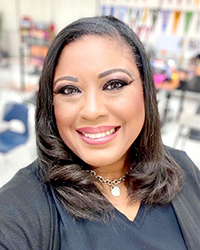
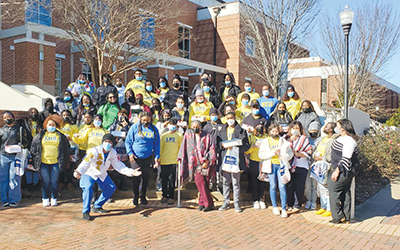
Auburn University Outreach hosted a group of students from Leesburg High School, located in Leesburg, Florida. One of the chaperones of the group was Auburn alumna, Rosalyn Castille, who received her bachelor’s degree in political science from Auburn University and was also employed in the Admissions Office.
Castile is in her eighth year at Leesburg High School where she teaches courses such as American Government and Economics, and World History and US History in the Social Studies Department, and courses such as AVID I in the Electives Department. Castile has also served as the head cheer coach for the last five years. A strong advocate for education and young adults, her motto is “always seek to motivate, encourage and empower.”
Castile often brings real–world applications to her classroom where she creates an environment that is challenging yet engaging. A favorite among her students, she is often at school and community events supporting them. In addition, she serves as the TRIAD club sponsor. Castile is also a program assistant with the Leesburg Boys and Girls Club where she mentors children in the community.
She is the proud mother of two children: Ryan and Rylan. In her spare time, she enjoys college football, collecting picture frames, happy planning and spending time with loved ones.
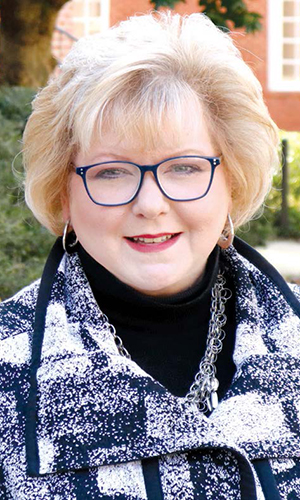
Hope Stockton has been named assistant vice president for University Outreach and Professional & Continuing Education in Auburn’s Division of University Outreach. A member of the Auburn family for more than 20 years, Stockton previously served as executive director for the Office of Professional & Continuing Education, or OPCE, in the division.
“During her tenure in University Outreach, Hope Stockton has provided dynamic and effective leadership to her office, significantly expanding its array of professional and continuing education offerings, as well as building new outreach enterprises serving thousands,” said Royrickers Cook, vice president for University Outreach, in announcing Stockton’s appointment. “She has greatly increased the capacity of University Outreach and Auburn reaching more citizens and professional clients across Alabama and beyond through high quality, high impact continuing education programming.”
Stockton brings extensive administrative and financial management experience to the position along with a comprehensive background in planning, developing and administering professional and continuing education programs. She earned her bachelor’s degree in finance and history from Huntingdon College and a master’s degree in management from Troy University, with additional doctorate-level studies in adult education at Auburn University. Prior to her employment with Auburn, Stockton spent 13 years in healthcare management and worked for the United States Army Budget Office in Vicenza, Italy. She came to Auburn in 2003 to lead the Blue Ridge Conference on Leadership in the College of Business before being hired in University Outreach as OPCE director.
As assistant vice president for University Outreach and Professional & Continuing Education, Stockton will continue her oversight of OPCE as well as leading University Outreach’s implementation of the Auburn strategic plan priorities for increasing non-credit continuing education offerings to new clientele and markets, especially in the expanding corporate and high-tech sector of the state. Additionally, the position will focus on creating greater opportunities for collaboration with campus and external stakeholders in developing new non-credit programs.
“Hope is a seasoned and highly effective professional, well respected in the national continuing education community of practice,” added Cook. “This new title appropriately reflects her accomplishments, her standing in our division, and this expanded strategic role in advancing the professional continuing education enterprise at Auburn.”
“Working with Dr. Cook and the University Outreach team has been an honor,” noted Stockton. “I look forward to this great opportunity to build upon our success in professional and continuing education and tap into the many new markets emerging across our state and region.”
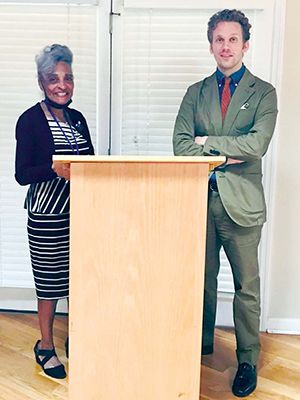
Elijah Gaddis of Auburn University’s Department of History accomplished two firsts during the spring semester.
He taught “Race and Landscape in the Loveliest Village on the Plains,” the department’s first course taught on the history of Auburn. Additionally, he worked with Osher Lifelong Learning Institute, or OLLI, at Auburn to offer the class not only to history students enrolled in his class, but also to OLLI students.
“I wanted to teach this class with what I call triple enrollment—undergraduates, graduate students and OLLI members—because I really liked the idea of these three groups of people learning together,” said Gaddis. “So often, our students get isolated from the communities around them, more by circumstance than by choice. I thought for a class that was so rooted in place and local particularities, that I would strive to reconnect these Auburn students to the wisdom and experience of the place they live in.”
Through a lens of race and landscape, the class examined the development of Auburn as a place through the stories of people who lived, worked and attended school there. Beginning with Creek settlement and eventual removal, students worked through Auburn’s history in the broader context of histories of American society and higher education. Topics included the enslaved workers that constructed much of Auburn’s campus, the relationships between students, professors and townspeople and the long struggle for human and civil rights by the inhabitants of Auburn.
The logistics of offering a class to both students enrolled through Auburn University and OLLI at Auburn were a little tricky. OLLI works on the quarter system and has a longer spring break than the university academic calendar, so OLLI students committed to beginning class earlier in January and attending through their break. Plus, OLLI classes usually only meet one day a week, so there was more of a time commitment on their part.
For the graduate and undergraduate students, the class met three days a week, and for OLLI students, it met on Mondays and Fridays, leaving Wednesdays for Gaddis to tend to the business of class expectations, projects and grades. Meetings were hybrid, with OLLI students zooming into the classroom at Broun Hall on Mondays and undergrads and grads attending both in person and by Zoom at OLLI’s headquarters at Sunny Slope on Fridays.
For all the juggling that went into the schedule, venues and use of technology, it was agreed among students that the class was a success. One OLLI member of the class, Professor Emeritus Larry Gerber, retired from Auburn’s History Department 10 years ago. Originally from Los Angeles, he came to Auburn in 1983 after earning his doctorate from Berkeley and teaching at several other institutions.
“My main reason for taking the class was to learn more of Auburn’s own history, especially with regard to the African American presence in the community,” he said.
The triple enrollment was a draw, too.
“I think it was a very interesting opportunity,” Gerber said. “Elijah is a lively instructor who makes every effort to involve his students in discussion. I am very appreciative of Elijah’s willingness to take on the extra work entailed in accommodating OLLI students in a class designed primarily for AU students.”
A more recent retiree and OLLI member, Caroline Gephard, retired from Tuskegee University’s Department of English in December of 2021 after a tenure of 27 years. A graduate of the University of Virginia, Gephard has lived in Auburn for 29 years.
“I decided to take the course not only because the subject matter interests me, but also because I am working on a history of another university. So I am being exposed to all sorts of perspectives and materials that will aid in my own research,” she said. “And it’s turned out to be fun! Professor Gaddis’ exciting course revealed hidden histories and raised profound questions about how people relate to and understand the landscape in which they live. It was a brilliant idea to focus on Auburn specifically.”
When asked about being a student alongside traditional Auburn students, Gephard said, “I really enjoyed the field trips, which allowed me to get to know some of the other students, especially the graduate students. It was a real pleasure to be part of a multigenerational class, and Professor Gaddis is a dynamic, thoughtful and enthusiastic teacher who is responsive to all his students.”
For Gaddis, the discussion and learning that the group did together exceeded his expectations. The Auburn undergraduate and graduate students introduced OLLI members to different ways of seeing and thinking about history that are generational and not easily accessible in everyday conversation.
“We grappled with difficult topics in a very local context. For the Auburn students, as indeed for me, the OLLI members were like a whole separate set of teachers in the room (since so many of them are retired professors.) Whenever we got to meet in person, I was thrilled to see the conversation between class members continuing well past our allotted fifty minutes,” said Gaddis.
He appreciates that OLLI members bring so much of themselves to their classes and make conversations deeper and richer because they start from a place and with a set of experiences that traditional students do not have.
As for Bishop Weiderbach, a senior from Alabaster, Alabama, he took the class because he was intrigued by the topic of Auburn’s history but being in class with retirees enriched the class.
“I had never been in an intergenerational class before,” he said. “It was really cool.”

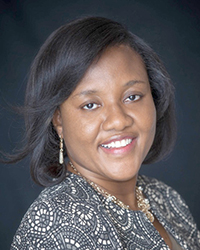
Global engagement continues to be impacted by the COVID-19 pandemic, but in the midst of these challenges, the Outreach Global office considered and adopted innovations that move global initiatives forward even in times of complication and crisis.
In conjunction with its campus and global partners in West Africa and Europe, the Outreach Global office continues to engage in both virtual and in person short term non-credit courses, and capacity building programs with partners to promote cross cultural learning, enhance intercultural knowledge and provide a space for students, faculty, staff and alumni for global opportunities.
The program features both virtual and in person business/industry site visits, reciprocal faculty lectures at partner schools, cultural excursions, service learning, research and networking opportunities with students, staff, faculty and stakeholders from the partner countries. The courses and training focus on adult education, civic education, entrepreneurship, general education, Irish culture and literature, nursing, pharmacy, community outreach programs and cultural immersion activities.
The goal is to continue to provide hands–on experiences, prepare students with the practical skills required for working in today’s global market and development in both virtual world and in person as the pandemic improves.
Commenced in 2021, these courses and trips will continue this year with Ireland partner, Tess Maginess professor, Queens University and her team. The program is available to undergraduate, graduate students, adult learners, alumni and interested constituency.
Contact Elizabeth I. Quansah, director of Auburn University’s Outreach Global, at eid0001@auburn.edu or 334-844-5716 for collaboration and information about the programs.

During the month of February, BraveHeart Center for Place and Purpose, or BCPP, held a blanket drive to assist those most vulnerable in the community. The Warm Hearts Blanket Drive was created to build community through a partnership between the Office of Public Service and BCPP while meeting a need in the local area. These blankets assisted recipients facing cold winter days and nights including those who are ill, those with limited resources and the elderly. The Office of Public Service collected over 100 blankets for BCPP. Participation from the staff of University Outreach, the Cross-Cultural Center for Excellence and Osher Lifelong Learning Institute, or OLLI, was critical to the success of the project.
One member of OLLI even hand-made two boxes of blankets that she donated to the drive. Lynn McLane, a retiree from California, moved to Auburn seven years ago. Before moving to Auburn, she worked for AT&T for 25 years and Target for 11 years. One of her daughters was a student athlete at Auburn and while visiting her, McLane fell in love with the city. During the pandemic, McLane needed something to do, so she started crocheting blankets. The longer she stayed in the house, the more she crocheted. As she says, “I got obsessed with crocheting”.
While crocheting, McLane knew that she wanted to give the blankets to a good cause but did not know where to donate them. When Scott Bishop, director of OLLI, informed the participants in OLLI about the drive, she knew that they would go to a good cause. McLane is very active in OLLI programs and is eager to return to in-person classes. In addition to attending OLLI sessions, McLane invested in an embroidery machine and embroiders towels in her spare time. She is still crocheting but focusing more on baby blankets. She loves sewing, baking and spending with her grandchildren.
For more information about BraveHeart Center for Place and Purpose, visit cla.auburn.edu/cpp. For more information about OLLI, visit auburn.edu/outreach/olliatauburn.
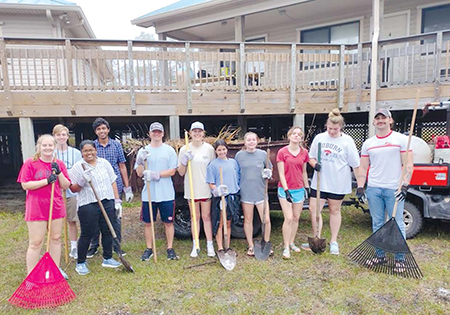
While many students around the nation use their spring break to relax or go have fun, a group at Auburn University involved in the service organization Alternative Student Breaks, or ASB, spent their break making a difference in three southeastern communities.
ASB is a student-led service organization on Auburn’s campus that seeks to promote active citizenship by fully engaging Auburn students in an affordable and educational service experience. ASB provides students with the opportunity to become involved in community-based service projects that allow them to help members of other communities.
The 34 Auburn ASB members serving during spring break 2022 split into three groups that volunteered in three different places. One group traveled to Memphis, Tennessee, one to Port St. Joe, Florida, and the other to Greenville, South Carolina.
“Participating in service opportunities like ASB teaches Auburn students the value of serving and selflessly loving others,” Caroline Condon, president of Auburn ASB, said. “It is important that our students learn this compassion within the Auburn community, but also any community they may be a part of.
“Community is crucial to life, and it’s important that we recognize the power of the human touch as students, so that as we graduate, we continue to reach out to our communities when they are in need.”
In Memphis, a group led by Meleah Montgomery worked with Serve901. The agency works on social issues such as criminal justice reform, education equity, food security, homelessness and more. They pair volunteer groups with nonprofits in the community to extend a helping hand. The first half of spring break, students volunteered with Bluff City High School, a public, tuition-free, college preparatory charter school serving a diverse population in Memphis, Tennessee. Their mission is to help transform public education, so all students graduate prepared for college, leadership and life. Volunteers reorganized the library, the uniform closet, the computers and chargers, cleaned the cafeteria and entry way and conducted a round table with 11th and 12th graders to answer questions they had about college and other general important topics.
The latter half of the week the students volunteered with Multinational Memphis, a Christian organization that shows kindness to refugee and immigrant families in Memphis, Tennessee. Volunteers helped kids with literacy and math skills, participated in recreational activities with the kids and assisted them in cleaning, while acting as positive role models.
The group in Port St. Joe, led by Caroline Owens, served at the St. Joseph Bay State Buffer Preserve. The team of volunteers traveled by boat to Little St. George Island to clean up the beaches and make fire lines around the buildings in preparation for upcoming burns. In the process they learned about the different types of wildlife and flora that reside on the island. Students also cleaned beaches at the Apalachicola National Estuarine Research Reserve. At the reserve, students learned how pollution has significantly reduced the oyster population in Port St. Joe, an area that once thrived off oystering.
Owens says the trip was a great learning experience. “This gave the volunteers, and me, a newfound sense of motivation and purpose as we were able to see firsthand how environmental impacts had affected the locals living in this area,” said Owens. “During our last two days of volunteering, we were able to help clean up the facilities at St. Joseph’s Bay Preserve and enjoy some time in the water. Each of us left having made ten new friends, with a deeper appreciation for the Port St. Joe area and the impacts of environmental advocacy, and with a stronger desire to serve.”
Under the leadership of Dylan Bowen, the third group traveled to Greenville, South Carolina to work at the Greenville Free Medical Clinic, a nonprofit organization that provides free medical care to eligible low-income and uninsured Greenville County residents. These volunteers organized patient charts and files, separated expired medications from the packaging so it could be sent to hospitals for incineration, painted the bathrooms accessible to the patients and helped tidy and clear the basement of any trash and old medical devices.
All of the locations for ASB’s trips are chosen by site leaders, who are assigned a topic such as health care, environmental advocacy or education reform. They then research and seek out locations where Auburn ASB can make an impact. Each trip ASB takes involves a team consisting of a site leader, trip advisor and Auburn students.
“I recommend ASB to any Auburn student that has the desire to learn and be challenged,” Condon said. “ASB has changed the way that I pursue knowledge and prioritize service. I have learned sympathy, gained friendships and seen new places around the world [through ASB].”
Students looking to volunteer with ASB can find more information about the organization at auburn.campuslabs.com/engage/organization/asb.
In 2021, the Auburn University Harrison College of Pharmacy, in partnership with the Alabama Cooperative Extension System, launched the “A Shot for Alabama” initiative through a grant funded by the Alabama Department of Public Health.
The goal is to target COVID-19 vaccine hesitancy and improve vaccine access in rural and underserved communities throughout Alabama.
The project was born out of the combined efforts of Marilyn Bulloch and Spencer Durham, associate clinical professors in the college who have been heavily involved in COVID-19 education, patient care and research since the onset of the pandemic, and Salisa Westrick, head of the college’s Department of Health Outcomes Research and Policy who has a long history of research focused on addressing vaccine hesitancy. The project also includes pharmacy faculty members Kimberly Braxton-Lloyd, Lynn Stevenson and Robert Helmer.
The initiative focuses on four geographic regions covering 21 counties, which may have low access to health care or have a high population of underserved minorities.
“The idea is not for us as the experts to go into these communities and to provide the information,” said Bulloch. “They do not know us. Patients in these counties are significantly more likely to be receptive of information that comes from someone they know and trust, like their pastor.”
Alabama Extension will work with pharmacy experts and community leaders in these counties to develop education materials on COVID-19 vaccines, which community leaders will distribute in targeted areas.
“Our role is to develop the materials for these community leaders and help them understand how to deliver it to the community that trusts them but may be uncertain about whether the vaccine is best for themselves or their family,” said Bulloch.
A Shot for Alabama also involves providing vaccines directly in the communities as requested by community partners.
“Pharmacists have been on the front line of immunizing against COVID-19 and can play a critical role in reaching Alabama communities that might not otherwise have information or access to vaccinations,” said Braxton-Lloyd. “As a land-grant institution, with the mission of taking new knowledge to the people of Alabama, A Shot for Alabama is helping to provide critical education and access to vaccination services.”
The Auburn University Pharmaceutical Care Center, which was tasked with administering the COVID-19 vaccine to the university community, is well equipped to handle the requirements for vaccine administration in the project’s target areas.
Mobile clinics are being deployed to areas within the target regions that are identified by community partners and Alabama Extension agents. Anyone interested in hosting a vaccine clinic can contact the AUPCC at aupcc4u@auburn.edu.
These clinics will serve a vital role in some areas where immunization opportunities are scarce.
“Building relationships and connecting with underserved communities can have a long-lasting impact on preventing and responding to future public health crises,” said Bulloch. “Auburn and the Harrison College of Pharmacy are positioned to take on this challenge. Indeed, the efforts of A Shot for Alabama are hoped to leave a positive and lasting impression throughout our state for years to come.”

Auburn University’s Office of Inclusion and Diversity, or OID, has invested in several long-term diversity, equity and inclusion programs as part of its Inclusive Excellence Programming Grant.
This program supports Auburn’s efforts to establish an inclusive environment for all by providing the seed funding and support for new, innovative and impactful approaches that advance diversity, equity, inclusion and accessibility on Auburn’s campus. In addition, the awardees also will advance programs and initiatives that support elements of the Auburn University Strategic Plan, including an Elevated Auburn Experience and Operational Excellence.
The recipients of these grants will create impactful and engaging initiatives for the Auburn Family.
“By supporting a wide variety of projects across the university, we continue to build an environment where all members of the Auburn Family are able to thrive,” said Taffye Benson Clayton, associate provost and vice president for Inclusion and Diversity. “I continue to be impressed by the meaningful initiatives that our community develops and the collective commitment of our institution.”
One effort funded was the College of Veterinary Medicine Veterinary Intensive Program, or VIP. The award from the Inclusive Programming Grant was matched by Dean Calvin Johnson to support a one-week program on Auburn’s campus offering current college students small and large animal medicine experience, professional skill development and preparation for both the interview process and completion of program applications, while encouraging a diverse student and alumni population that will ultimately benefit both society and the overall veterinary profession.
VIP is focused on its goal of fostering diversity by engaging a participant pool that is reflective of the diverse population across the state of Alabama. During this weeklong program, students will gain experience in various areas including hands-on labs, rotations with local partners, including the Bailey Small Animal Teaching Hospital and John Thomas Vaughan Large Animal Teaching Hospital, discussions on diversity in veterinary medicine and preparation for applying to veterinary school.
The first annual summer Veterinary Intensive Program will occur July 11-15 on the Auburn campus. Meals and lodging will be provided for all participants for the duration of the program.
“We believe this program will widen the diversity of prospective veterinary students and increase access to the vast career paths available to them,” said Dr. Melinda Camus, associate dean for academic affairs in the College of Veterinary Medicine. “Our college is grateful for the collaboration among our college leadership and DVM candidate Indya Woods toward this successful proposal.”
The other programs to receive funding through the Inclusive Excellence Programming Grant for 2021-22 include:
Black History Month Speaker Series: Vanessa Holden: The author of “Surviving Southampton: African American Women and Resistance in Nat Turner’s Community” will speak with students from multiple departments.
Diversity and Inclusion in Entrepreneurship: Marketing, promotion and other outreach activities to increase the ongoing participation of underrepresented populations in the Auburn University Tiger Cage Business Idea Competition and the New Venture Accelerator.
First-Generation Student Peer Mentor Program: In January, the College of Liberal Arts Student Services office kicked off peer mentoring and community support, partnering a currently enrolled sophomore, junior or a senior with a first-year freshman or transfer first-generation student.
OurSTEMstory: This campaign from the Department of Biological Sciences and Office of Inclusion and Diversity raised awareness about the contributions of historically underrepresented groups in STEM through a seminar series.
Exhibit of The Harrison School of Pharmacy’s Diversity: Teams of faculty, staff, students and others created visual submissions focusing on themes of culture, people, unity, traditions, connections, childhood, comfort and joy.
Care of Marginalized Patient Populations: The School of Nursing hosted a panel earlier this month for senior nursing students to engage with healthcare professionals in nursing and non-nursing fields who specialize in the care of marginalized patient populations.
APAEP Community Conversations: Build the World You Want: Alabama Prison Arts + Education Project will increase campus visibility of their arts and educational programming inside Alabama state prisons by hosting events throughout the year.
Forum: Inclusivity at the Office, on the Jobsite, in the Field: Hosted by Career Services in the College of Liberal Arts, this session discussed how companies can create a welcoming culture that allows different experiences and perspectives to be heard.
OID will continue to advance diversity and inclusion efforts at Auburn through the Inclusive Excellence Grant Program and ongoing projects. For those with new or existing programs that would be a good fit for the Inclusive Excellence Grant Program and strengthen the campus community’s commitment to diversity, the 2022-23 funding cycles will be released this summer.
Next academic year, Student Involvement in the Division of Student Affairs also will introduce a process to support registered student organization initiatives that enhance diversity through the organization fund request process.
To learn more about the program, please visit the Inclusive Excellence Programming Grant webpage. For more information on Auburn’s commitment, initiatives and progress toward building a diverse, equitable and inclusive campus, visit the Office of Inclusion and Diversity.
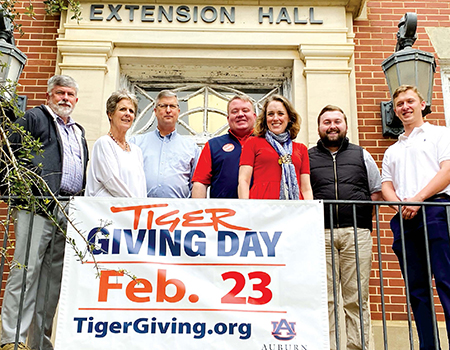
The Government and Economic Development Institute, or GEDI, was excited to participate in Tiger Giving Day for the first time this year with their project, Technology for Training.
“It was an honor for GEDI to be selected to participate in our very first Tiger Giving Day. We are excited that our project will help us reach even more people throughout the great State of Alabama to support them in achieving their training and professional development needs,” said Jeremy Arthur, GEDI director.
GEDI is tasked with training economic developers, elected officials, municipal workers, and community leaders all over the state. Many of these people depend on GEDI for professional certifications, some of which are mandated for their jobs. Since the COVID-19 pandemic began, GEDI has converted many programs to digital formats with online and hybrid offerings. The new program enhancements make it necessary for GEDI to upgrade technology and equipment to continue providing important services throughout the state, expand course offerings and allow participants to advance in their careers in the most cost effective, safe and convenient way possible.
“Without our Tiger Giving Day donors, our project would not have been possible. GEDI had donors from every corner of Alabama give to our project which truly highlights our statewide impact and footprint. This project helps GEDI further achieve our mission through engagement, economic prosperity and an improved quality of life for Alabama’s government and economic and community development leaders,” explained Arthur.
GEDI programs provide Alabamians with education and skills to make their lives better, excel in their careers and help their communities grow and thrive. The added funding provided by Tiger Giving Day will allow those programs to reach more people than ever.

A new partnership between the Auburn University Department of Aviation and United’s Aviate program will provide students a direct pathway from the classroom to the flight deck.
The Aviate program, offered at only seven other universities in the country, connects aviation students with United pilots, travel privileges and career development opportunities. After graduation, participating Auburn students will fly for an Aviate United Express partner, and after meeting program requirements, will transition to United Airlines as First Officers.
Auburn Aviation Chair James Witte said the partnership—announced at a ceremony at Ag Heritage Park on the Auburn University campus on Feb. 15—is a testament to the strength of Auburn’s program.
“The Aviate program sets a clear path for aspiring commercial pilots to follow. It further illustrates that the realm of professional flight is a challenging undertaking,” Witte said. “The Auburn program is based on work, hard work, and our commitment to flight and academic excellence. We require three levels of student growth: skill, knowledge and attitude. Continued emphasis on those three areas create the professional aviators we all strive to be.”
Aviate accepts candidates who display leadership potential, commitment to quality service and a passion for excellence in the aviation industry. In the program, students will have access to unlimited travel privileges through United, career development opportunities and flying experience with United Express partners. Participants also are paired with United pilots, who act as mentors and help students network.
“The professional development and mentorship provided in the Aviate program provide experiential learning beyond the classroom, particularly with non-technical aviation skills such as leadership,” said James Birdsong, Auburn Aviation program coordinator. “The United Aviate program creates a symbiotic relationship between the airline and participants. The airline recruits and develops highly qualified, well-educated pilots; participants earn the opportunity for a direct path to a United Airlines flight deck –a win-win for both parties.”
Upon successful completion of Aviate requirements, participants will transition to United as First Officers, then begin their journey toward becoming United Airlines captains.
“We are thrilled to partner with Auburn University and are confident they will be an invaluable asset to Aviate due to their innovative approach to the aviation market, prestigious reputation and rigorous training,” said Capt. Curtis Brunjes, managing director of Aviate and pilot strategy for United Airlines. “We look forward to working with them and welcoming more pilots to the United family.”
Auburn University began teaching aviation administration in the 1920s, and its flight programs are among the longest operating in the U.S. Each program and initiative in the Department of Aviation is built on a foundation of global awareness, technological expertise and a commitment to advancing the field of aviation. The Professional Flight major equips graduates with piloting skills and aeronautical knowledge.
“The United Airlines values of sound leadership, service and dedication are displayed every day both in and out of the classroom and during training by our aviation students,” said College of Liberal Arts Interim Dean Ana Franco-Watkins. “With the Aviate program, we are excited to provide our students with another opportunity to become the next generation of leaders in aviation and inspire others to follow their example of excellence.”
For more information, visit the Department of Aviation and United Aviate.
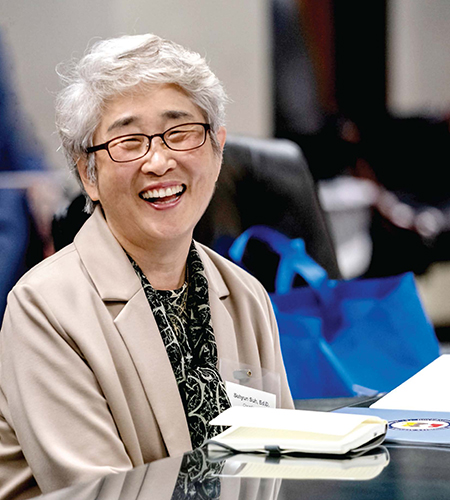
Suyhun Suh, coordinator for Korea Corner was appointed to the advisory board for the Governor’s Office of Minority Affairs by Alabama Governor Kay Ivey. The Governor’s Office of Minority Affairs is a cabinet-level agency with a mission to ensure the inclusion of women and minorities in the success and prosperity of the State of Alabama. As an appointee, Suh will play an integral role in decisions and policymaking on issues directly affecting women and minorities in the State of Alabama.
Suh has a long-standing commitment to education, outreach and engagement opportunities aimed toward promoting cross-cultural understanding. As an associate professor emerita for Special Education, Rehabilitation and Counseling in the College of Education, Suh initiated the Global Studies in Education program. Recognizing the need to provide cultural experience to educators, the program sponsors a 17-day trip to South Korea, immersing Alabama teachers in the Korean culture through exposure to the Korean educational system, history and culture.
As coordinator for Korea Corner, Suh has furthered her commitment to creating outreach programs and learning opportunities that educational experiences and collaboration between Auburn faculty members, students and the local Korean community.
The Korean After School program, offered by Korea Corner in collaboration with Auburn Youth Programs, began providing Korean after-school language and culture classes in Auburn City Schools in 2018 and has since expanded its offerings to include virtual options. The program is free of charge and is designed to strengthen the connection between Korean and American culture and society.
Suh continues to demonstrate her service to the citizens of Alabama as an advocate for civic engagement. In 2019, she organized the first Korean American Grassroots Conference, or KAGC, in Alabama. The largest nationwide network of Korean American voters, the KAGC is a nonpartisan, not- for-profit organization dedicated to uplift the voice of our community through active civic participation. The conference, in its second year as of 2021, is a joint effort with the national Korean American Grassroots Conference in Washington, D.C., the Overseas Koreans Foundation and the Alabama Governor’s Office of Minority Affairs.
Suh exemplifies Korea Corner’s mission to promote active collaboration among its campus and community constituents. In 2020, she, along with community volunteers, dedicated their time to the East Alabama Food Bank where they sorted and packed 1.2 tons of canned goods; later that year, Korea Corner donated thousands of medical supplies to regional health care centers, addressing the critical shortage of personal protective equipment for health care workers fighting COVID-19; and in 2021, the Korea Corner donated 9,000 masks to be distributed across Auburn City Schools’ nine elementary schools.
In her newest role as an appointee to the advisory board for the Governor’s Office of Minority Affairs, Suh will give her voice on behalf of women and all minority communities across Alabama especially in the areas of education, health, economics, political participation and empowerment, housing, employment, civil rights, criminal justice and race relations. Governor Ivey expressed her confidence in a letter to Suh, “I trust that you will rise to the occasion and set a standard for others to follow.”
Korea Corner provides educational and cultural resources to both Koreans and non-Koreans in Auburn and was founded with the help of the Consulate General of the Republic of Korea in Atlanta, the Office of the Vice President for University Outreach and the Office of Professional and Continuing Education. For more information, visit auburn.edu/outreach/opce/koreacorner.
The Governor’s Office of Minority Affairs, or GOMA, was created in March 2016 focused on advising the Governor on issues directly affecting Alabama women and minorities. The cabinet-level agency is the first of its kind in the state and second in the nation. For more information, visit goma.alabama.gov/about-goma.
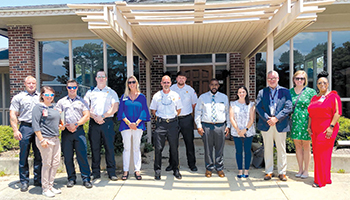
In response to the significant health disparities across rural Alabama, University Outreach began exploring options to expand healthcare access, particularly in regions significantly adversely impacted by COVID-19 in October 2020. Throughout this time, faculty across Auburn University’s colleges were engaged in conceptualizing ways to address rural health needs. By partnering with university leaders in pharmacy, nursing, human sciences and Alabama Cooperative Extension System, the team began vetting several telehealth options and select communities for an initial pilot project.
After extensive research and considering all input, the team formalized their commitment to launch the rural health project in Chambers County in August, 2021. The team ultimately determined that the OnMed telehealth station would best meet the needs of the community in this location. This state- of-the art technology provides patients with high tech and highly engaging interactions with licensed clinicians, complete with diagnostic tools available for practitioner-guided self-use.
While in the conceptualization phase of the project, the Auburn University team members forged relationships with leaders from the City of LaFayette, Alabama, as well as Chambers County Commission. This collaboration resulted in identifying a vacated health clinic as the ideal location for not only the telehealth station but the offering of other much needed health education and wellness programming. From this realization, the Chambers County Community Health and Wellness Center was framed.
Project leadership has been working closely within the City of LaFayette and other communities throughout Chambers County to discuss the project concept with community members. Recognizing that community engagement is at the heart of every outreach project, team members have attended city council and commission meetings, the mayor’s association, Rocking Fest, Back to School Bash, Community Center Merry-Go-Round event, professional development day at the schools, Rotary Club meetings, Civitan meetings and other events as opportunities arise. From this engagement, the team learned that community members are excited to have Auburn University present in this capacity and are eager for increased local health and wellness options.
Once complete the Chambers County Community Health and Wellness Center will be positioned to engage university students and faculty from diverse disciplines with community members to support their overall well-being. Specifically, nursing students are planning to assist with diabetes management and asthma education. Pharmacy students will provide medication management education and speech, language and hearing students can support communication needs. Ongoing COVID-19 vaccinations and testing will also be provided.
Examples of other disciplines intending to engage are kinesiology, social work, nutrition science, human development and family science and counseling. Other disciplines are welcome and invited to participate as capacity allows. AmeriCorps VISTAs and Albert Schweitzer fellows will join the staff to provide full support as the project develops.
The project is slated to launch as soon as the critical central building renovations are complete. The first phase of the project will include telehealth station demonstrations as well as health and wellness education events. The center is expected to be fully operational in fall.
In the true spirit of collaboration, the Chambers County Community Health and Wellness center is supported through cash and in-kind contributions by Blue Cross Blue Shield, the Alfa Corporation, Auburn University, The Alabama Cooperative Extension System, The City of LaFayette, Chambers County Commission and the Alabama Department of Economic and Community Affairs, or ADECA. For more information, contact any of our partners or send email to AURuralhealthproject@auburn.edu.
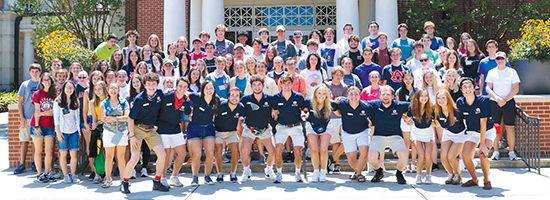
According to recent data by Alabama Possible, a statewide nonprofit organization dedicated to reducing systemic poverty and its root causes, Alabama is the nation’s sixth poorest state. More than 800,000 citizens, including 262,000 children, live below the poverty line. Eleven of Alabama’s 67 counties have poverty rates above 25% and the state has a child food insecurity rate of 22.3%. Because of this clear state-wide need, in 2013 the Honors College at Auburn University adopted poverty awareness as an overarching educational theme that supports Auburn University’s mission to directly serve the pressing, unaddressed needs to disadvantaged communities and at-risk populations. In keeping with Auburn’s land-grant mission and with Auburn’s historic commitment to service, the Honors College developed the Week of Service program.
Incoming students in the Honors College at Auburn University trade in their last week of summer vacation to embark on a week long service-learning project prior to the start of fall semester. Each August, nearly 100 students experience first-hand the impact that poverty has through a variety of service-learning opportunities. The event inspires and engages Honors College students to work towards one-day eliminating poverty in Alabama. Five values drive the program – justice, empathy, relationships, authenticity and action.
The program was designed to give participants an experience that is both challenging and enlightening. A traditional academic approach is mixed with hands-on learning to develop a deeper understanding of the issues surrounding poverty including its causes and consequences. During the week, participants simultaneously gain a strong knowledge base of material through multiple lectures, topical films and videos, educational activities and article discussions all while participating in the hands-on service work.
In past years, Week of Service has partnered with service organizations across Lee, Macon and Montgomery counties including: Alabama Rural Ministry, or ARM, Habitat for Humanity ReStore, Storybook Farms, Salvation Army of Lee County, Salvation Army of Montgomery County Soup Kitchen, Jean Dean RIF, Food Bank of East Alabama, Our House, Redeeming Grace Ministries, Auburn Public Library and the Kreher Preserve and Nature Center.
One of the more “eye-opening” experiences comes in the form of a poverty simulation originated by the Missouri Community Action Network. This simulation places the student in the shoes of people who live at or below the poverty line. Students live a simulated three weeks while supporting a family, paying bills and dealing with unanticipated circumstances. This simulation puts the hardships of living in poverty into a real-life perspective.
Through these simulations, service locations and academic studies, students are forced to take a deeper look at the difference in the lives of themselves and others. In fact, in a survey with students who participated in the program, 77% stated participation in the Week of Service influenced their involvement through community service and academic choices while at Auburn University. Thanks to the program, these students are creating an environment of service that is synonymous with Auburn University. Students often describe the experience as “enlightening” and an “eye-opening experience that deepened my understanding of poverty, including how it looks and ways I can volunteer in order to alleviate the struggle.” August 2022 will mark the program’s ninth year in service.
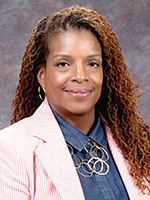

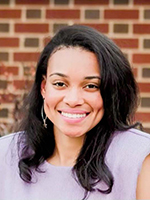
The annual Martin Luther King, or MLK, program sponsored by the East Central Alabama Chapter, National Forum of Black Public Administrators, or NFBPA, Auburn University Outreach and Office of Diversity and Inclusion, or OID, was held virtually pm Monday, Jan. 17. The theme of the program was “Closing the Gap on Health Disparities in the Community,” featuring Auburn University Rural Health Project and Keynote Speaker, Cheryl Brewster, senior executive dean for Diversity and Inclusion, Roseman University.
The Auburn University Rural Health Project, initiated by Auburn University Outreach, is an effort to close the gap on health disparities across rural Alabama. The project is a collaboration between the Alabama Cooperative Extension System, the City of Lafayette, Chambers County Commission and a collective of university departments.
The project is being implemented through the Chambers County Community Health and Wellness Center with an anticipated launch date of June 2022. The Center, located in Lafayette, Alabama, will provide patient care and education through an OnMed Telehealth Station and students from the departments of Speech and Hearing, Nursing, Pharmacy, Education, Social Work and Kinesiology.
Brewster discussed the disparities that exist within health care systems among underrepresented populations as related to patient care, bias and discrimination. In remedying these concerns, Brewster emphasized the importance of medical schools developing strategies that will widen a more diverse pool of applicants; leaders within the medical community providing educational awareness to their employees about implicit bias and how it impacts patient care and the hiring process; and eliminating the practice of expecting diversity, equity and inclusion to be the sole responsibility of one person or office, but placing that responsibility on organizations as a whole.
During the program, three individuals were acknowledged by NFBPA for their hard work and efforts in providing measures to enhance the safety and welfare of residents in Lee County during the COVID-19 pandemic. Dr. Fred Kam, director of the Auburn University Medical Clinic, received the MLK Education Award for his diligence in keeping the university updated on COVID-19 protocols, as well as organizing testing sites and vaccination clinics here on campus.
In addition, City of Auburn officials Mayor Ron Anders Jr. and Auburn City Manager Megan Crouch received the MLK Community Service Award for working with various constituents throughout the Lee County community to provide a medical clinic in the former Tuesday Morning building to serve as a COVID-19 vaccination site. Auburn City personnel contributed more than 4,250 hours at the clinic, and community volunteers served another 8,900 hours. The city invested a total of $136,579 to ensure the community had access to vaccines.
Each year, the sponsors of the MLK program award scholarships to local high school students. The two MLK Scholarship Award recipients for 2022 were Laila Haynes from Auburn High School, who is pursuing a major in criminal justice, and Orah Preston, who plans to major in pre-med. Congratulations to the MLK Award recipients!

The Government and Economic Development Institute, or GEDI, and the Auburn University Harbert College of Business continue to host free entrepreneurship workshops across the state of Alabama as part of a grant provided by the Department of Commerce’s Economic Development Administration. Workshops were held in Troy, Opelika and Auburn, Alabama, from the last quarter of 2021 through the first quarter of 2022. Due to the success of those programs, GEDI received numerous requests from communities wanting to host similar workshops. In response to these requests, workshops were added in Phenix City, Dothan and Fairfield.
The Entrepreneurship Pop Up Workshops are offered free of charge and led by LaKami Baker, Russell Foundation associate professor of Entrepreneurial Studies at the Harbert College of Business, and David Mixson, associate director of GEDI. They are designed to help increase the odds of success for small business owners and aspiring entrepreneurs. Based on the Lean Startup Methodology championed by the National Science Foundation’s I-Corps Program, participants learn about value proposition development, market potential identification, business modeling and risk assessment. Additionally, attendees connect with local development resources and expand their network of partnership. Auburn’s University Center is a partnership among its Government and Economic Development Institute, the Lowder Center for Family Business and Entrepreneurship and the Office of External Engagement. This cross-disciplinary approach enables the center to broaden its mission and impacts, resulting in a stronger, better developed innovation and entrepreneurship ecosystem in Alabama. For more information on Auburn’s EDA University Center and the entrepreneurship workshops, visit auburn.edu/outreach/gedi/eda.
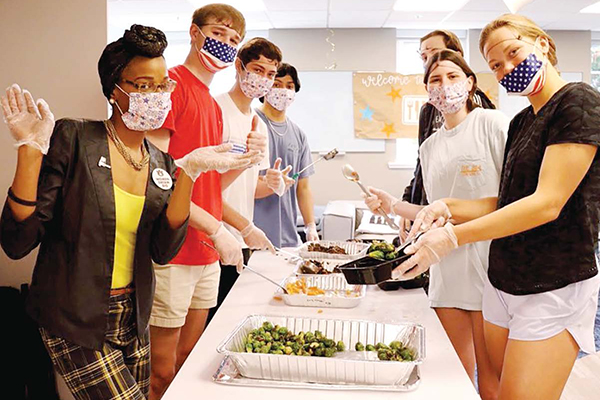
Campus Kitchen has officially moved to their new location in Lupton Hall. This gives them the opportunity to be in the center of campus to support as many people on campus as possible. Before moving to Lupton Hall, Campus Kitchen was housed in Toomer Hall. The new location gives the volunteers more space to recycle and redistribute food.
The number one goal of Campus Kitchen is to fight food insecurity in the Auburn and surrounding communities by providing opportunities for students to volunteer to prepare, serve and deliver meals throughout Lee County. Unserved food from campus dining locations is used to create nutritious meals for people in need. Campus Kitchen provides weekly meals to Meals on Wheels, Esperanza House, Salvation Army, Greenwood Baptist Church, Auburn United Methodist Church, I am my brother’s keeper and others.
In addition to weekly deliveries to external agencies, the Auburn university students are welcome to come to Lupton on Tuesdays at noon, and Fridays from 12 p.m.–1 p.m. and 5:30 p.m.–6:30 p.m. for the Auburn Family Meals program. Students can eat on site or take meals with them.
For more information about Campus Kitchen, visit instagram.com/campuskitchen_au/?hl=en.
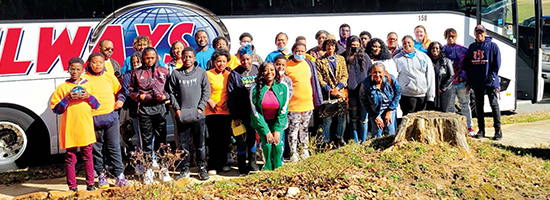
Young Professionals in Training, or YPiT, is a pipeline to college program geared towards underrepresented students grades 6-12 in Lee, Macon and Chambers counties. The program curriculum comprises three components, Social Emotional Learning, or SEL, taught by Ja’Lia Taylor, founder of YPiT, doctoral candidate, Special Education, Rehabilitation and Counseling; Career Discovery, facilitated by Deja Trammell, graduate assistant, Career Development Center; and Environmental Sustainability Exploration, led by Martina McGhee, assistant clinical professor, Education, Curriculum and Teaching. The YPiT sessions have been conducted virtually each month due to covid. However, students were able to engage face to face with peers and other members of the program during a recent field trip to the Equal Justice Initiative, or EJI, in Montgomery.
Several other people play a major role in providing a safe, healthy and educational experience for YPiT students. Tamarcus Millner, president of the Curtis House and educator was instrumental with the planning stages of YPiT. He provides a space at the Curtis House for YPiT programs and various community engagements. Shikia Carter, doctoral candidate, Special Education, Rehabilitation Counseling, is the graduate assistant for YPiT and Center for Educational Outreach and Engagement, or CEOE. She assists with the overall operations of the program. Shikia oversees mentors, works closely with parents and students, provides administrative support and serves as the point of contact for YPiT.
The mentors of YPiT are an esteemed group of individuals consisting of faculty, professionals and undergraduate and graduate students. They serve in various capacities including, facilitating group discussions, providing moral support to students, working closely with parents to identify the needs of their child/ children and offering tutoring in their area of expertise.
Some of the mentors include, Jailin Sanders, lead mentor, senior, Industrial and Systems Engineering; Whitney Lee, graduate student, Community Planning, employee, Auburn University Outreach; Cody Shelton, doctoral student, Aerospace Engineering; Aly Hoeher, employee, Innovation Advancement and Commercialization; Elizabeth Devore, doctoral student, Electrical Engineering; Hyunsung Jang, doctoral candidate, Educational Psychology; Diego Gomez- Maldonado, researcher, Sustainable Bio-based Materials Lab; Chloe Jones, doctoral student, School of Kinesiology; and Jeff Reese, department head, Special Education, Rehabilitation and Counseling.
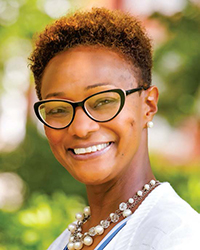
Jocelyn Vickers has been named director for the Office of Public Service, or OPS, a unit of the division of University Outreach. Vickers joined OPS in January. Prior to joining University Outreach, she served as the director for the Cross-Cultural Center for Excellence in the Office of Inclusion and Diversity. Vickers is a four-time graduate of Auburn University and has been employed with the university for over 23 years. She has experience working with pipeline, outreach and retention programs. Her goal as OPS director is to find ways to strengthen the relationships with local and state partners. Vickers advises two student organizations and co-advises Campus Kitchen and Circle K through OPS. She is very active at her church, St. Mary’s Catholic Church, serving as a lecturer, Parrish council, and treasurer for the St. Vincent De Paul Society. She also enjoys all sports but loves coaching youth basketball. She is a native of Mobile, Alabama, but has lived in the area for over 20 years with her husband, Jermaine, and son, Jaylin.
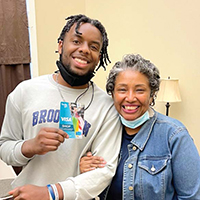
Auburn University Outreach is excited to announce the launching of a student ambassador program. The program comprises a group of bright and talented students who will promote the various services, programs and initiatives offered through Auburn University Outreach. In promoting Auburn University Outreach, the student ambassadors will develop marketing strategies, advertise programs through tabling and social media, develop and facilitate workshops upon request and participate in community service initiatives. For additional information, contact Venus Hewing at vrh0003@ auburn.edu.

The Office of Public Service, or OPS, has been awarded five AmeriCorps VISTA members for the next three years. Their service will begin August 2022. Jocelyn Vickers, director of OPS says, “This partnership would not be possible without the assistance of Joyce Thomas-Vinson, retired assistant director of Public Service. Prior to her retirement, Joyce submitted the original concept paper to AmeriCorps to begin this process. Once the concept paper was approved, all that was left was to submit the grant.”
The five VISTA members will work collaboratively with OPS in various areas. Two VISTA members will work with the rural health initiative addressing areas of health disparities, two VISTA members will address food insecurity through Campus Kitchen and research related to food access and sources of food insecurity, and one VISTA member will work with the Center for Educational Outreach and Engagement to strengthen the pipeline to higher education through curriculum development and professionalism.
The VISTA members will not only assist with capacity building in the Office of Public Service but will also strengthen the ties between the university and the community. This opportunity will give University Outreach approximately $225,000 in fellowship dollars to for these opportunities. For more information about AmeriCorps, visit https://americorps.gov.
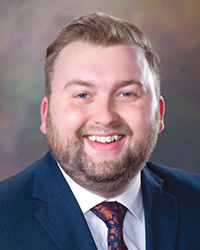
Jordan Kramer joined the Government and Economic Development Institute, or GEDI, team in December of 2021 as a training program specialist. In this role, he coordinates the Economic Development Association of Alabama, or EDAA, Leadership Institute, the Alabama Local Government Training Institute, the Intensive Economic Development Training Course, and many other programs and events. Kramer graduated from Auburn magna cum laude, earning his bachelor’s degree in political science, with a minor in community and civic engagement. Prior to joining GEDI, he worked in political research and support positions in Washington, D.C. He also completed internships with the House Democratic Caucus and the office of Representative Martha Roby.

Government and Economic Development Institute, or GEDI, director and former president and CEO of the Chamber of Commerce Association, Jeremy Arthur, was presented with the prestigious Jamie Wallace Award during The Partnership annual meeting of the Chamber of Commerce Association of Alabama, or CCAA, and Business Council of Alabama, or BCA, held in Birmingham in December 2021. The award is presented to chamber professionals who have displayed outstanding attributes in their daily vocation. It is awarded only in years in which an individual meets the strict stated criteria and is chosen from nominees submitted by CCAA members and awarded by an outside panel of judges.
In presenting the award, Morri Yancy, Institute of Organizational Management and president of the Lake Guntersville Chamber of Commerce and 2017 Jamie Wallace Award recipient, said of Arthur, “Jeremy’s personal and professional efforts have gone above and beyond the duties assigned. His unwavering dedication to CCAA and his relentless commitment to improving the chamber profession, truly embodies what the Jamie Wallace Award is all about.”
Arthur was surprised by the award and said he felt “shocked, surprised, unworthy, humbled, thankful and grateful” in being named the recipient. “To have my name even listed anywhere near the name of Jamie Wallace is humbling. Jamie is one of the greatest men I’ve ever met,” Arthur added.
Arthur started his chamber profession as president and CEO of the Prattville Chamber in 2004 where he served eight years before joining CCAA as president and CEO in 2012. In February 2021, Arthur left the chamber profession to serve as director of the Auburn University Outreach Government and Economic Development Institute. His knowledge and vision are instrumental in expanding the reach of GEDI programs and services, and in moving the department forward to continued success.
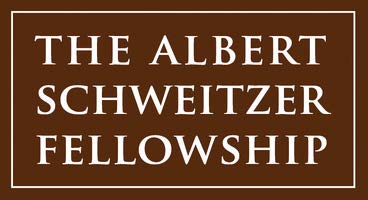
Auburn University’s Office of Public Service has partnered with the Albert Schweitzer Fellowship, or ASF, the College of Nursing, the Social Work Program, the Harrison College of Pharmacy and the College of Education to sponsor five graduate students for this prestigious service inspired fellowship. ASF of Alabama was founded in 2015 as part of the national network with a vision to create a group of leaders who promote positive change in their communities, health and human service systems and the world. Participants receive a stipend and leadership coaching, as they strive to serve and empower people to live healthier lives. Students who are awarded this fellowship participate in a 200-hour service project in the local community. Faculty and professionals from participating institutions select students following an extensive review of their application. Students then have one year to complete their project.
This year’s projects began March 2022 and will continue until April 2023. The Auburn University students chosen this year are Chigozie “Joi” Chinakme, Harrison College of Pharmacy, doctor of pharmacy program; Chelsea Gayre, College of Nursing, family nurse practitioner program; Micah Grey, Harrison College of Pharmacy, doctor of pharmacy program; Jou-Chun Pan, College of Education, clinical rehabilitation counseling master’s program; and German “Andres” Tovar, Harrison College of Pharmacy, doctor of pharmacy program.
To ensure the success of the program, the Office of Public Service matches donations from participating Auburn University schools and colleges. For more information about the Albert Schweitzer Fellowship, visit asfalabama.org.

Hollie Cost, assistant vice president for University Outreach and Public Service, has been elected to serve on the board of directors of the National Issues Forums Institute, or NIFI.
Cost, a three-time Auburn graduate, has established four special education degree tracks, multiple outreach programs and the Office of Service Learning and Community Engagement as a university professor. Cost also has served as a city council member and two-term mayor of Montevallo, where she helped establish community enhancement initiatives focusing on arts, sustainability and education with an emphasis on youth engagement.
She was elected along with Sara Mehltretter Drury of Wabash College, Jon Gant of North Carolina Central University and Robert C. Richards Jr. of the University of Arkansas.
NIFI is a nonprofit, nonpartisan organization devoted to promoting deliberation about difficult issues facing the public. Cost and other new board members were elected based on their commitment their work in their communities to promote civic engagement. “From their significant local work with National Issue Forums, NIFI board members glean valuable insights that can be shared nationwide,” said Betty Knighton, NIFI president. “Hollie, Sara, Jon and Robert have each inspired deeply impactful civic engagement in their states, and we appreciate their willingness to contribute their experiences to the broad national network of NIF practitioners.”
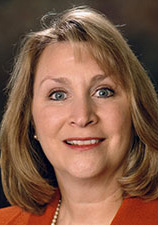
Claire Twardy, assistant director in the Office of Professional and Continuing Education, or OPCE, retired in March after 16 years of service. She joined OPCE in 2006 where she oversaw professional development programs and conferences. She is credited with growing the tax and accounting professional seminars across the southeast, initiating the AP Summer Institute, and coordinating numerous professional development programs. Twardy will continue to enjoy living in the loveliest village on the Plains and looks forward to cheering on the Tigers with her husband, Joe, and spending time with her two daughters.
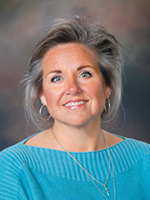
Michelle Blount earned her bachelor’s degree in humanities and social sciences from Auburn University at Montgomery. Prior to joining the Office of Professional and Continuing Education as a coordinatorfor business and administrative services in June 2021, she served in both the for- and non-profit sectors for over 25 years as an office/financial administrator. Michelle and her husband, Ronnie, have two sons and enjoy spending time with them on their family farm.
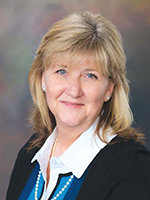
Lisa Howze joined the Office of Professional and Continuing Education in 2022 as an administrative support associate. Howze is an appointed notary public and brings more than 18 years of combined experience in payroll and administrative work. A native of Opelika, she now resides on Lake Harding in Salem, Alabama, where she enjoys boating, fishing and spending time with her children and five grandchildren.
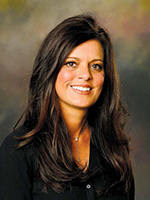
Tammy Pannell joined OPCE in March as an administrative support specialist. Pannell moved from LaGrange, Georgia, to Opelika, Alabama, where she graduated from Opelika High School and went on to earn her associate degree from Southern Union State Community College. She brings more than 20 years of experience in customer service and administrative support to her role.
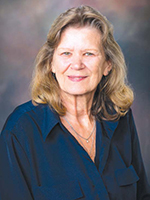
Patricia Bloser earned her bachelor’s degree in psychology from Shippensburg University and a master’s degree in adult education from Auburn University (’19). She joined the Office of Professional and Continuing Education in September of 2012 as a program developer. In 2021, Bloser transitioned to the role of office manager and supports OPCE efforts through processing accounts payable/receivable, managing contracts, overseeing payroll and posting positions for staffing. Bloser has over 20 years of combined experience in program development, management and administration.
Auburn University Outreach is partnering with Alabama Cooperative Extension System to host a bus tour of local communities across the state of Alabama. The tour will provide faculty, staff and university administration with an opportunity to connect, experience and understand Alabama’s assets as well as some of the challenges experienced by residents across our state. The goal will be to learn more about what Auburn can do to positively impact these areas and create change that will propel those communities toward a brighter future. The prospect of creating this experience for our faculty and staff to better understand the circumstances some of our citizens face will enable Auburn to better fulfill the important mission it has as a land grant institution. The details of the trip are being discussed and finalized and will be promoted throughout the summer.
In partnership with Black Belt Treasures Cultural Arts Center, the Caroline Marshall Draughon Center for the Arts & Humanities hosted a special holiday event on December 4, 2021. Over 400 people visited Pebble Hill to shop at the holiday market, meet artists and learn about their craft, and listen to live music. Black Belt Treasures Cultural Arts Center is a non-profit organization based in Camden, Alabama. The organization was started with the objective to stimulate the economy in Alabama’s Black Belt region through the sale and promotion of fine arts and heritage crafts, as well as the provision of arts education opportunities.
Kristin Law, director of Arts Programs at Black Belt Treasures, says “We greatly appreciate the opportunity to introduce our artists and our incredible region to people outside of the Black Belt. It doesn’t just benefit us and our artists for one day, but for the entire year. We look forward to returning again this year.”
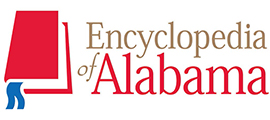
The online Encyclopedia of Alabama, or EOA, attracts approximately 1.3 million visitors each year. Are you one of them? If you have not visited the site EncyclopediaofAlabama.org, you should check it out. There are more than 2,300 articles and 5,600 images to discover.
The articles found on EOA range from topics like the Wetumpka Crater, which Auburn University geology professor David T. King proved conclusively was caused by a meteorite impact, to an article on Mobile, AL, native Alva Smith Vanderbilt Belmont, a suffragist who was an influential member of the Gilded Age’s elite society in New York. Whether you are looking for more information about an endangered animal species in the state, images of the fossils of creatures that once roamed the lands of what is now Alabama. or a bit of history about the Alabama town your grandparents were born in, you can find it and so much more in the Encyclopedia of Alabama. If the 2022 Winter Olympics or the July 2022 World Games—hosted by Birmingham, Alabama,—has inspired you to visit one of the many sports related museums across the state or learn about Olympic medalists and other top athletes with ties to Alabama, EOA is a good starting point. One of the categories used to aggregate its content is “Sports and Recreation.” The “Features” section also offers a selection of articles arranged by specific themes like “Alabama Olympians.”
The Encyclopedia of Alabama, a project of University Outreach in partnership with other cultural and educational organizations, is the state’s premier online resource for information on Alabama’s history, culture, geography and natural environment. It is available free from any device connected to the internet.
Beginning the spring semester, Auburn University is waiving admission application fees for students from eight of Alabama’s Historically Black College and Universities, or HBCUs, interested in pursuing post- graduate studies in one of the university’s more than 190 graduate degree programs.
Designed to encourage enrollment in graduate school, the waiver program is one of several efforts the university is undertaking to strengthen its academic partnerships with HBCUs and encourage diversity in graduate education across the state. The waiver program follows Auburn’s recent initiatives with students at HBCUs, including a partnership with Tuskegee University and The Future Scholars Summer Research Bridge Program.
Alabama maintains more HBCUs than any other state in the U.S., providing a critical role in educating the next generation of diverse professionals. On average, 70 percent of America’s Black doctors earned a degree from an HBCU, with 50 percent of Black engineers and teachers and 35 percent of Black lawyers pursing undergraduate and graduate degrees. By creating additional opportunities for academically talented students, the waiver incentivizes students to remain in Alabama and consider Auburn University for graduate school.
“Creating more pathways for students to attend Auburn graduate programs will strengthen our university and add incredible value to our community,” said George Flowers, dean of the Graduate School. “We need the state’s top talent in our programs and are looking forward to deepening our relationships with HBCUs to better identify, open doors and welcome students who are interested in continuing their education here at Auburn.”
Eligible HBCUs include Alabama A&M University in Huntsville; Alabama State University in Montgomery; Concordia University in Selma; Miles College in Fairfield; Oakwood University in Huntsville; Stillman College in Tuscaloosa; Talladega College in Talladega; and Tuskegee University in Tuskegee.
“We are excited to work with the Graduate School on such a meaningful initiative to incentivize students from HBCUs in our own backyard to consider Auburn for post-graduate programs,” said Taffye Benson Clayton, associate provost and vice president for inclusion and diversity. “This partnership is one of a number of ways we are working to advance Auburn’s commitment to proactively work to eliminate barriers facing underrepresented community members and build a diverse campus community.”
For general questions about Auburn’s Graduate School, applicants can visit the official Graduate School website - graduate.auburn.edu or email gradadm@auburn.edu. For more information on Auburn’s commitment, initiatives and progress toward building a diverse, equitable and inclusive campus, visit the Office of Inclusion and Diversity site - diversity.auburn.edu and the Diversity, Equity and Inclusion page at www.auburn.edu/inclusion.

The Office of Sustainability was established in 2008 to create an ethic, practice and culture of sustainability at Auburn in service to improving lives, communities and natural systems in Alabama and beyond. The vision is for Auburn University to lead higher education in shaping the transformation to a sustainable world. Since the office was developed, Auburn University has implemented various projects and practices to advance sustainability campus wide as well as increasing overall awareness of the need to think about it in daily practice.
The office does not attempt to do the work alone. Instead, they work with students, alumni, faculty, staff and administrators. On campus, they seek to embed sustainability into the university’s operations, instruction, research and outreach functions. Additionally, they offer sustainability trainings and workshops for business, government and civic organizations.
Mike Kensler, director of the Office of Sustainability, emphasizes that partnerships are critical to their success. “We’re not taking credit for the work. We can’t do anything on our own,” said Kensler. “We collaborate with others and start the conversations about how we can be more sustainable.”
The office works with most of the campus community and has partnered on several successful projects. One such partnership was with the university architects and the Office of Campus Planning. Through this partnership, Auburn University committed to building only LEED, or Leadership and Energy in Environmental Design, certified buildings. These are more responsibly built, more healthy, more energy and water efficient buildings. In addition, studies show that people are more productive in LEED certified buildings.
Another successful partnership has been with Tiger Dining. The Office of Sustainability has worked with Glenn Loughridge, director of Tiger Dining, on several initiatives. Loughridge has been instrumental in creating a fresh local food system. The departments are working to develop an in-vessel compost machine. The project, which has been under development for a couple of years, will soon be implemented.
A partnership with the Procurement and Payment Services department has led to the development of sustainable purchasing guidelines. When making purchases, the university considers if the equipment under consideration is the most energy efficient, if the computers are responsibly made, if the cleaning products are green and if the printing paper recycled. These guidelines help staff make intentionally responsible purchases.
University Outreach has also partnered with the Office of Sustainability. Osher Life-Long Learners, or OLLI, worked with the Office of Sustainability to conduct an assessment which looked at the categories of energy, waste, water, purchasing, transportation, publications, administration and social. In each category, they viewed several strategies that increase sustainability. The results revealed that OLLI was doing well in recycling and reducing waste, but could improve in other areas.
Scott Bishop, director of OLLI said, “One thing I have become more mindful of is how much I personally and OLLI in general relies on hard copies. Maybe it is a generational thing, but I like to read documents on paper. Since we did this assessment, I have thought more carefully about hitting the print button.”
“I recommend to any department that they do a Peers Assessment,” Bishop added. “It helps you think more comprehensively about your department’s impact on the environment.”
Building a campus wide culture and ethic of sustainability ultimately comes down to individual commitment. “Everybody has the opportunity to make a really meaningful difference in the way we show up, the way we treat other and in making intentional decisions to leave our workplace a little better every day,” said Kensler. “The last line in the Auburn Creed is ‘I believe in Auburn, and I love it,’ but what does that look like in practice? I think if we all can reflect on what that looks like in practice and intentionally live that way, I think we are all contributing to a safer, more just, healthier world.” To learn more about the Office of Sustainability, visit sustain.auburn.edu.
The three pillars of Auburn’s land-grant mission– research, education and selfless service, focus on improving quality of life. Selfless service, emanating from quality education and life-enhancing research, yields impactful results. This is the motivation behind and the foundation of Outreach. Our division has a long-standing history of community impact through supporting and facilitating partnerships.
Since arriving on campus, I have studied the beauty and complexity of the Outreach landscape. As a centralized unit, Outreach has departments that support faculty engagement, continuing education, government training, lifelong learning, global community development, public service and k-12 programming, among others. Through these departments, we provide academic programming and camps to youth in underserved areas, distribute unserved food from campus dining to families throughout the region, provide global experiences to community members who typically are not engaged with communities beyond our national borders, provide critical professional development to government officials and industry employees, provide unique, impactful educational experiences for the aging population, and we are remapping the pathway to ensure that individuals who are incarcerated secure identification before leaving prison, enabling them to secure employment, housing and banking upon release. We firmly believe in leveraging Auburn University resources to improve the lives of Alabamians in such a way that positively impacts faculty, staff and students.
Beyond our centralized unit, I have taken notice of community-based work carried out through academic programs on campus. The College of Nursing promotes healthy eating, physical activity and oral care behaviors at regional schools through the TigerCHAT program. The College of Pharmacy engages with Mercy Medical Clinic, which provides care to medically underserved people throughout Lee County. Under the leadership of Sean Forbes and in collaboration with EFLT, Horticulture and Sustainability, O Grows installs and maintains gardens that serve as outdoor classrooms, the basis for school reform and hunger relief. The College of Liberal Arts supports BraveHearts, a health and wellness program for young adults with developmental disabilities. This is a mere snapshot of outreach programming radiating from Auburn University.
As I take stock of our centralized and program-based initiatives, the message that resounds is the need to “tell our outreach story” in a way that reaches the masses and serves as a catalyst for deeper engagement. While research and instruction are undeniably critical functions of Auburn’s mission, outreach integrates and applies those functions with the capacity to transform the state. Better capturing and communicating our projects, programs and purpose is one means of working toward that end. This enables us to identify opportunities to fill gaps in programming and collaborate with others. To address this need, we have developed the Outreach Programs and Projects Network. This tool allows us to map outreach programs, providing a comprehensive visual of the impact we make across our state and empowering us to better connect with respect to individual outreach interests and shared goals. Additionally, we continue to maintain the AuburnServes network that enables community partners to document needs and volunteer opportunities available to students. University Outreach implores our campus and community friends to access these resources and join us in building a better Alabama. Through your partnership and participation, we can make an even greater difference in the lives of Alabamians.
Hollie C. Cost, Ph.D. Assistant Vice President for University Outreach and Public Service
Last Updated: July 11, 2022

